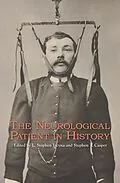Parkinson's, Alzheimer's, Tourette's, multiple sclerosis, stroke: all are neurological illnesses that create dysfunction, distress, and disability. With their symptoms ranging from impaired movement and paralysis to hallucinationsand dementia, neurological patients present myriad puzzling disorders and medical challenges.
Throughout the nineteenth and twentieth centuries countless stories about neurological patients appeared in newspapers, books, medical papers, and films. Often the patients were romanticized; indeed, it was common for physicians to cast neurological patients in a grand performance, allegedly giving audiences access to deep philosophical insights about the meaning of life and being.
Beyond these romanticized images, however, the neurological patient was difficult to diagnose. Experiments often approached unethical realms, and treatment created challenges for patients, courts, caregivers, and even for patient advocacy organizations.
In this kaleidoscopic study, the contributors illustrate how the neurological patient was constructed in history and came to occupy its role in Western culture.
Stephen T. Casper is Assistant Professor in Humanities and Social Sciences at Clarkson University. L. Stephen Jacyna is reader in the History of Medicine and Director of the Centre for the History of Medicine at University College London.
Autorentext
L. Stephen Jacyna, Stephen T. Casper
Klappentext
Essays from noted contributors trace the evolution of the neurological patient's role, treatment, and place in the history of medicine.
Parkinson's, Alzheimer's, Tourette's, multiple sclerosis, stroke: all are neurological illnesses that create dysfunction, distress, and disability. With their symptoms ranging from impaired movement and paralysis to hallucinationsand dementia, neurological patients present myriad puzzling disorders and medical challenges.
Throughout the nineteenth and twentieth centuries countless stories about neurological patients appeared in newspapers, books, medical papers, and films. Often the patients were romanticized; indeed, it was common for physicians to cast neurological patients in a grand performance, allegedly giving audiences access to deep philosophical insights about the meaning of life and being.
Beyond these romanticized images, however, the neurological patient was difficult to diagnose. Experiments often approached unethical realms, and treatment created challenges for patients, courts, caregivers, and even for patient advocacy organizations.
In this kaleidoscopic study, the contributors illustrate how the neurological patient was constructed in history and came to occupy its role in Western culture.
Stephen T. Casper is Assistant Professor in Humanities and Social Sciences at Clarkson University. L. Stephen Jacyna is reader in the History of Medicine and Director of the Centre for the History of Medicine at University College London.
Inhalt
Introduction
The Patient's Pitch: The Neurologist, the Tuning Fork, and Textbook Knowledge
Neurological Patients as Experimental Subjects: Epilepsy Studies in the United States
Speaking for Yourself: The Medico-Legal Aspects of Aphasia in Nineteenth-Century Britain
The Spouse, the Neurological Patient, and Doctors
Disappearing in Plain Sight: Public Roles of People with Dementia in the Meaning and Politics of Alzheimer's Disease
The Cursing Patient: Neuropsychiatry Confronts Tourette's Syndrome, 1825-2008
The Psychasthenic Poet: Robert Nichols and His Neurologists
The Encephalitis Lethargica Patient as a Window on the Soul
Neuropatients in Historyland
The Neurological Patient in History: A Commentary
Bibliography
List of Contributors
Index
